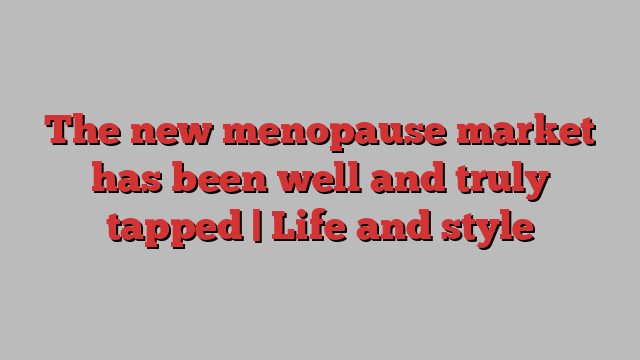
For my birthday last week, the algorithm gave me perimenopause ads. Happy birthday Eva, here is a future of anxiety, mood swings, brain fog, hot flushes and irregular periods, no gift receipt available sorry bye I love you. To be clear – Instagram is being previous. I remain calm, cool and bleeding, but also a member of the first generation of women actively aware of our soon coming menopause. Which has obvious benefits but also, less discussed, irritations.
The menopause revolution happened in stages. The first stage involved talking about it. People like Davina McCall started discussing the impact of menopause on her life – her body, her mental health – in ways that opened up conversations between women and their doctors, and their employers, and their families. Data emerged: one in three women were choosing not to go to their GP, despite 77% finding at least one symptom of menopause “very difficult”.
Things started changing. A month after McCall’s first documentary on the subject broadcast in 2021, one pharmaceutical company reported a 30% rise in demand for HRT products. Then corporations like Channel 4 and Google announced dedicated “menopause policies”, leading to 600 companies signing the “Menopause Workplace Pledge”, promising to support women in the working environment. This week MPs are calling for NHS health checks for 45-year-old women, and free HRT prescriptions. All good. All good! It was around the time of the workplace pledge, though – this summer, a heatwave predicted – that the third stage arrived and with it, things to buy.
A piece about menopause wellness in Vogue reported “an untapped market worth an estimated $600bn”. As well as supplements and “menopause doulas”, new products and services marketed towards menopausal women include special underwear, scented sprays for hot flushes, a skincare range “tailored to fluctuating cycles”, dedicated shampoos and beauty treatments, one of which left the Vogue writer with “skin far less inflamed than usual, and my soul soothed”. It trickled down. In August, Boots’ No 7 brand brought out a line of beauty products in the anti-ageing mould, “[choosing to] proudly put ‘Menopause’ on its packaging” and Primark presented a range of menopause nightwear with “anti-flush technology, cooling yarn and odour and temperature control”. Consider this market now tapped.
I don’t want to play down the mental or physical impacts of menopause: it sounds rough, and is a trial for thousands of people, who just want to get on with their work without sweating through a shirt or suffering anxiety attacks on the bus. I have no doubt some of these products are helpful (the pyjamas sound cool, a big sister to brilliant period pants), but many of them quack of opportunistic greed. Because, surely what is missing here, at the core of most people’s pain around menopause, is the fear that life as they know it is coming to an end.
Fertility is revealed as fleeting, and a person’s femininity comes starkly into question. We talk about feeling “invisible” as we age out of the period in which women are valued, as child-bearers or workers or figures of great and glorious beauty. Men retain their value as they get older, are propelled in fact, by their wisdom, their salt-and-pepper hair, but women’s worth drops as our bodies droop – we’re stuck within the tightest definition of femininity. These are the things, these are the realisations we wrestle with as menopause approaches. There should be a sense of freedom, shouldn’t there – the feeling that we are finally untethered from childbearing and those long dawn hours attempting to be beautiful, but of course there’s not. Our world has not yet granted us that. But it takes more than a scented spray to change it.
Which is why the rise in menopause marketing makes me mutter darkly into my tea. The joyful moment when women were suddenly allowed to talk about their bodies, hormones and fears was cut short by an ad for shampoo.
One problem with menopause is the lack of support for its symptoms. But the solution to the bigger problem, that women are not valued after they reach middle-age, is not: “buy 100 products that make you seem younger”. Perhaps a “glow cream” makes one menopausal woman feel better for an evening, but it does not help menopausal women as a whole. In fact, it could be argued that these aspirational products damage them further, by perpetuating the idea that looking young is the answer. And beyond that, by imposing a pressure familiar to most women, whether navigating motherhood, ageing, sex or work – the pressure to win at it. Or, as a menopausal friend messaged me yesterday, “Do I really have to have a ‘good’ menopause? Can’t I just feel a bit cross?”
Email Eva at [email protected] or follow her on Twitter @EvaWiseman